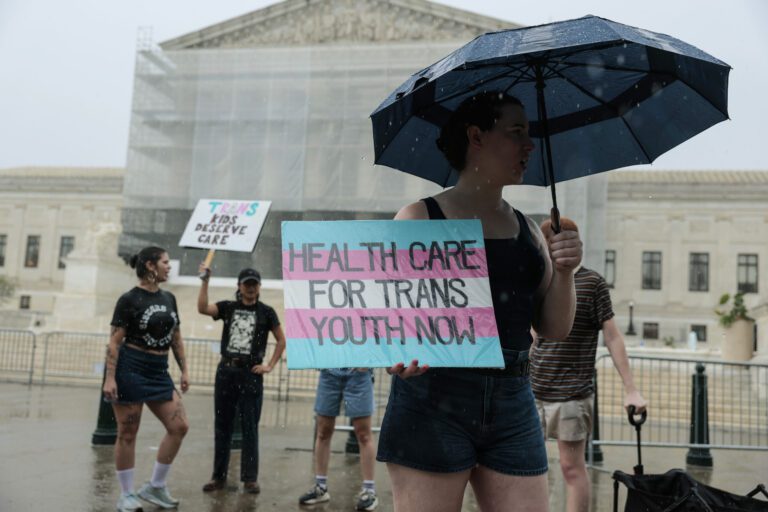Scrutiny Surrounds Trump’s Pediatric Gender Medicine Report
The recent publication of co-author names for the Trump Administration’s contentious report on pediatric gender medicine is stirring debate. The report offers a critical evaluation of medical gender treatments for minors and is marked by a team of scholars known for their skepticism towards these practices.
Overview of the HHS Report
On Tuesday, the Department of Health and Human Services (HHS) released its final version of the report, originally commissioned in early 2020. This investigation is purportedly the first comprehensive evaluation of pediatric gender medicine in the U.S. It critiques the provision of medical interventions, such as puberty blockers and cross-sex hormones, asserting they pose ethical concerns for minors without clear medical pathologies.
Key Findings:
- Risks of Treatment: The report claims that providing gender transition interventions to minors may conflict with established ethical standards.
- Minimal Editing: The final version included only minor adjustments following a months-long peer review, alongside a 240-page supplement addressing criticisms from prominent medical organizations, including the American Psychiatric Association and the Endocrine Society.
- Co-author Identity: For the first time, the names of all nine co-authors were revealed, many of whom have lengthy histories of skepticism towards medical gender treatments.
The Composition of Co-authors
All co-authors are recognized skeptics of youth medical transition interventions, which encompass:
- Puberty blockers
- Cross-sex hormones
- Gender-transition surgeries
This has raised questions about potential bias in the research and its findings.
Notable Points:
- The report’s criticism was fueled by the team’s skepticism towards pediatric gender medicine, showcasing arguments grounded in scientific rigor and ethical considerations.
- Prominent critiques from organizations advocating for pediatric gender treatments notably absent in peer review highlight the contentious nature of this discourse.
Responses to the Report
Criticism and Rebuttal
Diverse reactions to the report have surfaced from both supporters and detractors of pediatric gender treatments:
- American Academy of Pediatrics: They condemned the report for relying on insufficient data and perspectives.
- Psychiatrists and Medical Experts: Some critique the report’s methodology and assert that it overlooks the broader consensus on the efficacy of gender-affirming care.
Important Quotes
Dr. Leor Sapir, a co-author of the report, stated:
“Those who advocate for these interventions have the burden of proof to show that there’s a favorable risk-benefit profile… Critics have failed to identify significant errors in our report.”
Ethical Considerations in Gender Medicine
The report prominently raises ethical concerns surrounding pediatric gender treatments. Key arguments include:
- Medical Misdirection: The authors contend that health practitioners must prioritize patient safety and refrain from medical interventions that may be unjustified by existing evidence.
- Demand for Research: The co-authors acknowledged that while further research is needed, conducting high-quality studies might contradict ethical standards for human subjects research.
Response to Critiques from Advocacy Groups
Responses from advocates imply the report’s findings contradict extensive studies asserting the safety and effectiveness of gender-affirming treatments. However, the report vehemently argues that much of the existing evidence relies on weak foundations.
Broader Implications: Future of Pediatric Gender Medicine
The release of the report is timed with increasing political scrutiny over pediatric gender treatments. The argument for integrating psychotherapy as a primary treatment method is particularly contentious and faced backlash from transgender rights advocates.
Points of Contention:
- Perception of Conversion Therapy: Many advocates argue that the report’s recommendation to emphasize therapy over medical interventions equates to "conversion therapy," igniting heated discussions on ethical healthcare practices.
- Activist Reactions: The political implications of HHS’s review point towards a growing divide in how medical communities and political factions approach pediatric gender medicine discussions.
Conclusion: A Shifting Landscape
The HHS report represents not just a critical analysis of pediatric gender medicine but also a reflection of the shifting political and social landscape regarding gender issues in America. With advocacy groups on alert and medical professionals divided, the future of pediatric gender treatments remains uncertain.
Additional Resources
For further insights and detailed discussions on pediatric gender medicine, consider exploring:
The implications of this report will continue to reverberate throughout medical, political, and social discussions as the debate around pediatric gender medicine evolves.


